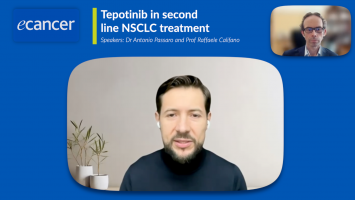ASCO 2015
Immunotherapy developments in lung, head and neck, liver and PD-1 response prediction
Dr Lynn Schuchter - University of Pennsylvania, Philadelphia, USA
With immunotherapy it’s really understanding a new way of how to stimulate the immune response. So these new approaches with PD1 antibodies more effectively stimulate the immune response and it does it in a different way. It essentially is taking the brakes off the immune system. You all know that when an immune response is stimulated there are counter-regulatory mechanisms that come into place to turn the immune system off. So these work very precisely by taking the brakes off and allowing for a fuller immune response.
Now you were talking about cancer cells holding up a red flag and I think that is true of a PD1 blockade in tumours with the mismatched repair deficiency that Dr Le was talking about. What was happening there and what’s the importance of it?
That study was looking at certain types of tumours, it happens in some types of colon cancer, some types of endometrial cancer, where there are a greater number of mutations because there’s a normal machine that repairs DNA damage. So if you are deficient in this repair mechanism the cancer has a greater number of mutations. So this means that there could be new antigens or new epitopes, new things, new red flags on the surface of the cancer cell that could then recognise, be stimulating to the immune system.
What is it about PD1 blockade that makes this so suitable in this particular situation of these MMR deficiencies?
I wouldn’t say that, I would say that these new types of immunotherapy with PD1 are more potent at stimulating an immune response and work very differently than past immunotherapies. The importance of the mismatched repair story is are there groups of patients who are more likely to benefit or not. So it’s an emerging theme that higher mutation load, maybe new antigens being present on the surface, would more effectively… that T-cells would more effectively recognise those cancers. So I don’t think it makes this type of cancer more susceptible but it tells us that this is a group of cancers that are more likely going to respond to the treatment.
Now Dr El-Khoueiry talked about hepatocellular carcinoma, that’s another tumour that we wouldn’t have thought of being amenable to immunotherapy. What was happening in that situation?
In that study they also looked at PD1 antibody in patients with advanced liver cancer and really saw some quite striking responses and very durable responses. It’s an interesting story emerging that maybe cancers that may be virally mediated are maybe going to be susceptible to these immunotherapies. Again, this may be linked to either something unique on the surface of the cancer cell that makes it more exposed to the immune system. So this was an activity of a PD1 antibody in a traditionally very refractory cancer.
What’s your view of the clinical applicability of this new immunotherapy in HCC then?
It was very encouraging results. I think we’ll need to see a greater number of patients treated but it looks very promising.
Could I ask you about head and neck cancer because that’s another tumour. Patients who had nowhere else to go are showing a response to immunotherapy now. What again is the trick there?
In that study also patients with head and neck cancer, the majority of the patients who received the PD1 antibody had a response. Interestingly in that study, some head and neck cancers are caused by a virus, HPV, but in this study there was no difference between if the cancer was virally associated or not. So, again, we’re learning more about which subset of patients are going to benefit but certainly very encouraging results of looking at PD1 antibody in head and neck cancer.
Now, in lung cancer there has already been some demonstration of checkpoint blockade being relevant here. So what did you make of the paper presented by Dr Paz-Ares?
This is an important study, it was a phase III trial comparing PD1 antibody to traditional chemotherapy and really showed a benefit in overall survival. So previously we knew that both pembrolizumab and nivolumab were active against squamous cell lung cancer and it’s FDA approved for those indications. But this study showed that in the other type of non-small cell lung cancer, largely adenocarcinoma, the medicine also worked in this situation. We’re seeing a growing incidence of adenocarcinoma; this is the kind of lung cancer that is increasing in number. To see that the PD1 antibody approach is useful in adenocarcinoma of the lung is very important. I suspect that this will lead to a change in the label and approval.
What should clinicians be taking home from all of these, effectively? Because they’re quite big signals here, aren’t they?
Right. So, important to see that these new immunotherapy approaches are going to be used against a much broader array of tumours than we thought. It’s very important for practising physicians to recognise that the toxicities are very unique, so these immune adverse events are different. It’s diarrhoea and colitis, it’s endocrinopathies affecting the thyroid and the pituitary. So we traditionally, as medical oncologists, work with infectious disease experts because of the risk of fever and neutropenia. That’s not the situation with these new immune therapies, they are very different side effects, so a lot of patient education, education to physicians about how to manage the toxicities.
So do you have any warnings to clinicians?
Yes, understand what the side effects are. Ask your patients and educate them on diarrhoea, that’s a life threatening potential complication. So it’s recognising that they are different than traditional side effects of chemotherapy.








